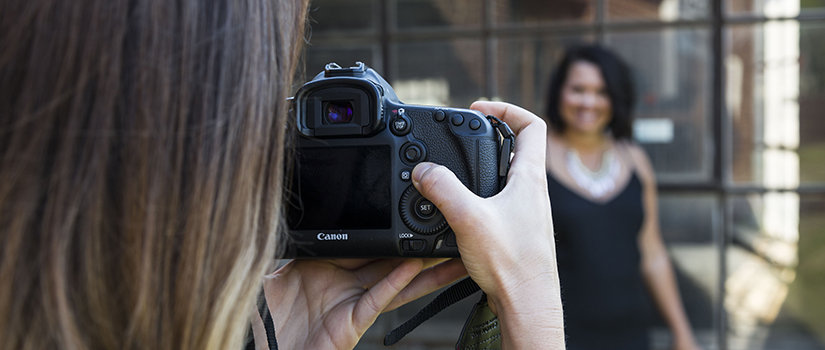Posted June 2, 2015
Reprinted from InterCom (pdf)
Story by Sarah Gledhill, senior public relations major. Photos by Deveney Williams, senior visual communications major.
Top Photo: Photographer Katherine Dalton out shooting for her business.
In January of her senior year, visual communications alumna Katherine Dalton decided to start her own business. She put her savings into making her own business cards, website and logo and rented a booth at a wedding expo to promote her photography. Today Dalton owns her own business, Katherine Dalton Photography, and specializes in wedding and fashion photography.
Dalton joins a record-high 13 percent of Americans who define themselves as entrepreneurs according to Forbes magazine. Entrepreneurship courses are growing in popularity at USC and other universities across the U.S., preparing students to venture out and create their own opportunities in numerous fields from arts and music to journalism or business and more. David Weintraub has taught freelancing classes since 2009; this is the fifth time his course has been offered at USC. It’s become increasingly popular among a variety of students, including many journalism majors.
“Entrepreneurship goes beyond freelancing,” said Weintraub. “I’m teaching students, how do you come up with the ideas and solutions to challenges that your clients may have and how do you help them solve those challenges? How do you create a business around that?”
In his course, students learn the techniques to successfully start and operate their own businesses. They create business proposals, track and manage billable expenses, promote themselves and sell their ideas. Weintraub runs the course like a lean startup, soliciting feedback from students and adapting to their needs as the semester progresses.
I want clients leaping at the chance to work with my students. David Weintraub
Isabelle Hardinge, a visual communications senior, took Weintraub’s freelancing class because of the practical skills she can take away from the course. The students study personal marketing strategies, collaborative brainstorming, finance and management skills – areas of study that Hardinge, like many other students, desired more hands-on experience in. Freelancing also provides a great foundation upon which recent graduates can build their careers.
“Having the skills of a freelancer will help me in other aspects of my future career,” said Hardinge. “Being an advocate for yourself, as you have to do as a entrepreneur, is really important for job searching. I’m a senior, so I’m using these skills every day to apply for jobs.”
While entrepreneurial experience does provide a great starting point for recent graduates, it’s often challenging for students to determine how their skills translate into something a client would pay for. Weintraub guides his students through the process of defining their skills and what they can do with them.
“What do you bring to the party that is different, special, or unique that your clients will pay you for?” asks Weintraub. “I want clients leaping at the chance to work with my students.”
As the trend of freelancing grows, it’s also becoming common for many creative professionals to supplement their everyday jobs with freelance work. Hardinge and others imagine themselves following a similar path.
“Freelancing feeds my creative side in a way that I might not be reaching at a regular nine-to-five job,” said Hardinge.
Dalton started her business with a similar intention of freelancing on the side, but soon decided that an office job didn’t fulfill her the way her business did. She knew her heart was in her photography, and she had to follow her passion despite the challenges of entrepreneurship.
“It’s a huge risk; it’s putting everything in one basket,” said Dalton. “But if you believe in what you’re doing and you’re good at it, don’t quit.”
